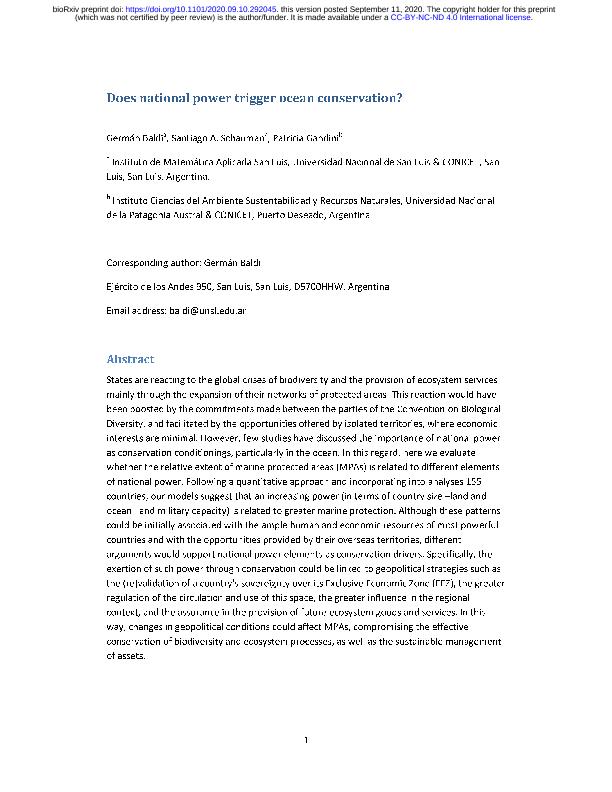Artículo
Does National power trigger ocean conservation?
Fecha de publicación:
11/09/2020
Editorial:
Cold Spring Harbor Laboratory Press
Revista:
bioRxiv
ISSN:
0362-4331
e-ISSN:
2574-531X
Idioma:
Inglés
Tipo de recurso:
Artículo publicado
Clasificación temática:
Resumen
States are reacting to the global crises of biodiversity and the provision of ecosystem services mainly through the expansion of their networks of protected areas. This reaction would have been boosted by the commitments made between the parties of the Convention on Biological Diversity, and facilitated by the opportunities offered by isolated territories, where economic interests are minimal. However, few studies have discussed the importance of national power as conservation conditionings, particularly in the ocean. In this regard, here we evaluate whether the relative extent of marine protected areas (MPAs) is related to different elements of national power. Following a quantitative approach and incorporating into analyses 155 countries, our models suggest that an increasing power (in terms of country size –land and ocean– and military capacity) is related to greater marine protection. Although these patterns could be initially associated with the ample human and economic resources of most powerful countries and with the opportunities provided by their overseas territories, different arguments would support national power elements as conservation drivers. Specifically, the exertion of such power through conservation could be linked to geopolitical strategies such as the (re)validation of a country's sovereignty over its Exclusive Economic Zone (EEZ), the greater regulation of the circulation and use of this space, the greater influence in the regional context, and the assurance in the provision of future ecosystem goods and services. In this way, changes in geopolitical conditions could affect MPAs, compromising the effective conservation of biodiversity and ecosystem processes, as well as the sustainable management of assets.
Archivos asociados
Licencia
Identificadores
Colecciones
Articulos(SEDE CENTRAL)
Articulos de SEDE CENTRAL
Articulos de SEDE CENTRAL
Citación
Baldi, Germán; Schauman, Santiago Augusto; Gandini, Patricia Alejandra; Does National power trigger ocean conservation?; Cold Spring Harbor Laboratory Press; bioRxiv; 2020; 11-9-2020; 1-16
Compartir
Altmétricas




